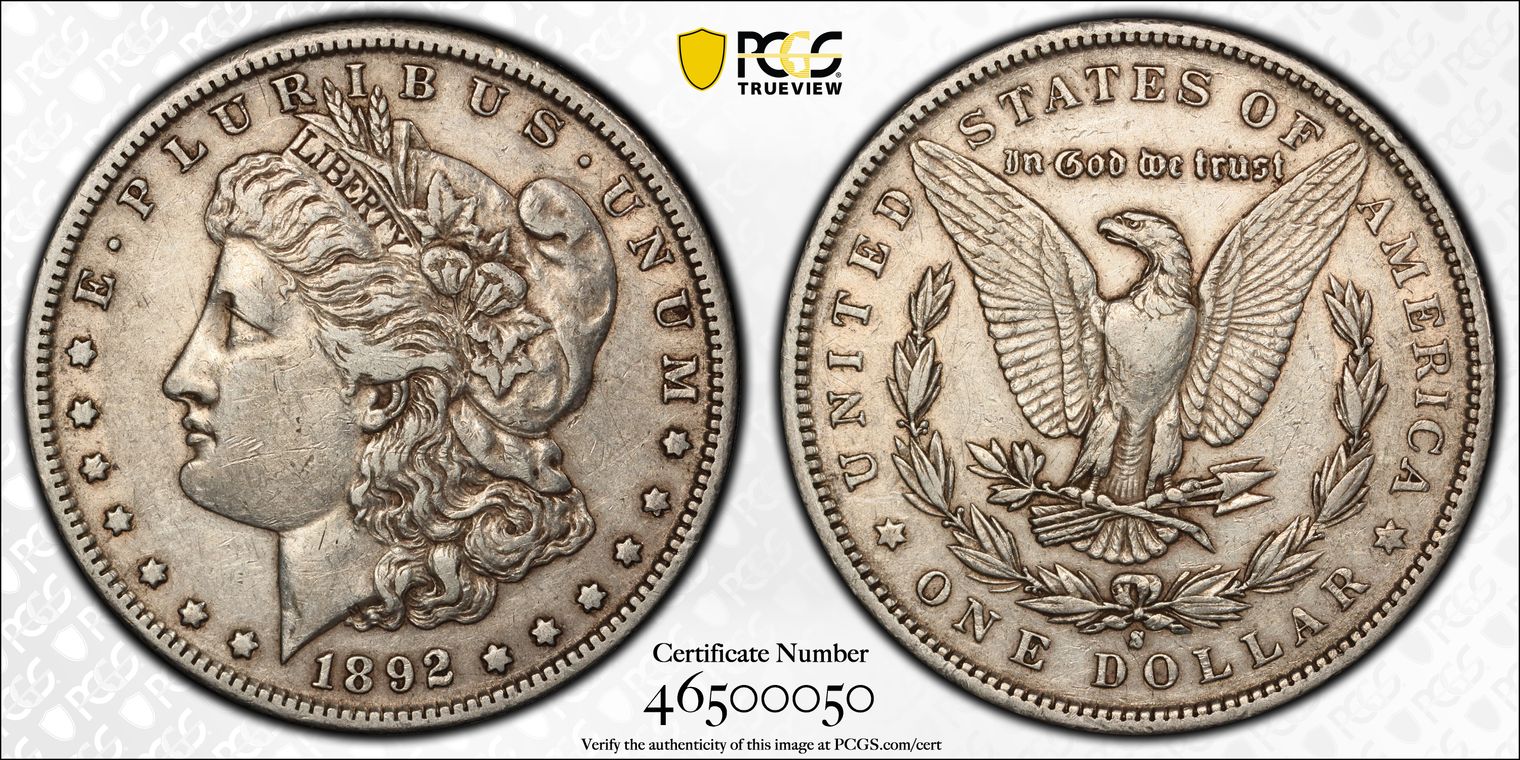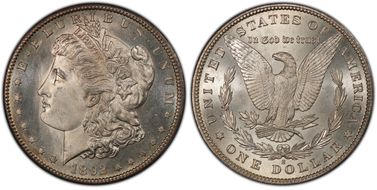1892-S $1 XF40 认证号46500050, PCGS号7218
专家评论
Q. David Bowers
The following narrative, with minor editing, is from my "Silver Dollars & Trade Dollars of the United States: A Complete Encyclopedia" (Wolfeboro, NH: Bowers and Merena Galleries, Inc., 1993)Commentary: The 1892-S dollar is one of those United States coins that is very common in worn grades but which is an extreme rarity at the MS-65 level. In 1992, a coin in VG-8 grade was worth about $10, while an MS-65 coin would have brought $50,000 or more at auction. In other words, an MS-65 coin is worth 5,000 times as much as a VG-8! The explanation is that many if not most 1892-S dollars were placed into circulation at or near the time of issue, and few were saved in Mint State.
However, in the days of long ago the 1892-S was not recognized as a rarity. No accolades were given to the issue whenever an Uncirculated coin crossed the auction block in the period extending up to 40 years after it was minted. In Ed. Frossard's sale of March 8, 1898, a Mint State 1892-S fetched $1.05; in the U.S. Coin Co. auction of May 19-21,1915, $1.50 was obtained for another; and in Thomas L. Elder's auction of April 13-14, 1917, $1.50 was again achieved. In fact, it was not until comparatively recent years that the rarity of the 1892-S has been recognized; this after the San Francisco Mint dispersals from storage in the 1940s and 1950s apparently yielded no bags of this date, nor were any among the untold millions of Morgan dollars paid out by the Treasury during the 1962-1964 emptying of government vaults. However, it is known that at least one bag of 1892-S dollars was paid out by the San Francisco Mint in 1925-1926. Few coins reached numismatic circles, as there was little collecting interest in Morgan dollar mintmarks at the time. Perhaps, some of the AU coins now known came from that release.
In higher circulated grades from EF-40 to AU-58 the 1892-S is readily available today. For a long period of time, such coins were overvalued in the market and were riding on the coattails of the truly rare Mint State coins. Stanley Apfelbaum, founder and president of First Coinvestors, of Albertson, New York, told me that in the 1970s his firm made a lot of money by selling AU 1892-S dollars to investors who did not know much about coins. His customers, for the most part, were not numismatists and were not part of the collecting fraternity. As they were much cheaper than Uncirculated coins, they appeared to be bargains, and selling them was easy to do.
Today, the 1892-S is known to be a rarity in higher grades, but for some unknown reason, the issue is not popular with collectors, dealers, or investors. It is almost as if a cloud is hanging over each 1892-S. Possibly, this commentary in Wayne Miller's widely-read Morgan and Peace Dollar Textbook turned potential buyers away.
The 1892-S has been denigrated as a poor investment by most advisory letters, to the effect that it is one of the few key date Morgans that is not instantly salable in fully gem condition. Because of the enormous price which a fully BU piece commands, AU specimens are often advertised at clearly exorbitant prices. Beware of high-grade 1892-S dollars which are toned on both sides. Such toning is often artificial, and is intended to cover up wear, abrasions, carbon spots, etc., or to mask the discoloration which occurs when a mintmark is soldered onto a silver dollar.
However, Miller was not creating news - he was reporting it. The 1892-S was a silver dollar without honor in its own country long before Wayne Miller took pen to paper to write about it.
I suspect another root cause is that years ago nearly all coins that were called "Uncirculated" were, upon careful examination, what we would call AU today. Because of this, historical prices as reflected in advertisements and catalogues over the years are not a guide to availability. "What an understatement!" exclaimed dealer and market-watcher Maurice Rosen, upon reading the manuscript of this book. (Undated commentary received by the author, November 2, 1992) "The same is true for a host of other dates including 1883-S, 1884-S, 1903-S, 1904-S, and 1921-S," he continued.
Circulated grades: In lower worn grades the 1892-S dollar is very common. In EF and AU 1892-S dollars were common as recently as the 1960s and 1970s, but today they are somewhat scarce. Perhaps Stanley Apfelbaum cleaned out the market so well, and placed the coins so far away from the mainstream of numismatic activity, that they will stay off the market for a long time.
Mint State grades: In true Mint State the 1892-S is very rare. In 1982, Wayne Miller expressed the opinion that no more than 200 choice (MS-63 or better) specimens exist. Beware of AU coins being offered as Mint State. The advent of the certification services has been a boon to silver dollar collectors, and you can bet your bottom (Morgan) dollar that an 1892-S certified by NGC or PCGS as MS-63, MS-64, or MS-65 is a dandy coin worth owning. Curiously, population reports issued by certification services indicate that more MS-65 pieces have been graded than have coins at MS-63 or MS-64 levels. The reason for this is not known, but resubmission of the same coins may have occurred. Also, there is some truth to the situation, in that high-grade 1892- S dollars I have seen have usually been very, very nice-such as MS-64 or MS-65-or have been close to MS-60. There is no large middle ground for this date in Uncirculated grades.
My population estimates follow: MS-60 to 62, 75 to 150 coins exist; MS-63, 25 to 50; MS-64, 10 to 20; and MS-65 or better, 25 to 50.
Most Mint State 1892-S dollars are well struck and have good mint lustre and a minimum of bagmarks. High-grade examples are usually a joy to behold.
Prooflike coins: Prooflike coins exist among the few surviving Mint State coins. DMPL coins are exceedingly rare; As of September 1992, just one had been certified.
Caveat emptor: It has been said that forgeries exist of the 1892-S dollar, and that most are 1892 Philadelphia Mint coins with an S mintmark added. However, Thomas K. DeLorey, who for a long time was director of the American Numismatic Association Certification Service, stated this: "I never saw an added S." Nevertheless, any high-grade 1892-S should be authenticated before purchase. Further, because of the wide difference in price vs. grade of authentic 1892-S dollars, it is important to have a coin graded carefully. In fact, caveat emptor with regard to an 1892-S dollar refers mainly to any purchase transaction in which you might engage. A slight difference in grade can mean a huge difference in price. Be careful!
Varieties
Circulation strikes:
1. Normal date: Breen-5627. Besides the VAM varieties, Walter H. Breen reports another: date well to right, traces of repunching on bases of 89; mintmark completely filled.
2. Doubled Date. Breen-5628. VAM-2. Usually seen in low grades. Rare.
Dies prepared: Obverse: Unknown; Reverse: Unknown.
Circulation strike mintage: 1,200,000; Delivery figures by month: January: 100,000; February: 100,000; March: 100,000; April: 100,000; May: 100,000; June: 100,000; July: 100,000; August: 100,000; September: 100,000; October: 100,000; November: 100,000; December: 100,000. (The uniform delivery rate of 100,000 coins per month in San Francisco during the year 1892 is remarkable in the annals of mint operations.)
Estimated quantity melted: Very few Mint State coins were melted. Most were released into circulation; hundreds of thousands of worn coins were part of general melts 1918 and later.
Availability of prooflike coins: A few surviving Mint State coins are prooflike (and included in the above population estimates). DMPL coins are exceedingly rare.
Characteristics of striking: Usually sharply struck. Known hoards of Mint State coins: None since the dispersal of a bag in 1925-1926, most coins from which went into circulation.
Commentary
Many if not most were placed into circulation within a decade or two of striking. The 1892-S is common in worn grades but is very rare in true Mint State.
PCGS #
7218
设计师
George T. Morgan
边缘
Reeded
直径
38.10 毫米
重量
26.73 克
铸币数量
1200000
金属成分
90% Silver, 10% Copper
更高评级数量
3150
评级较低的钱币数量
3191
地区
The United States of America
价格指南
PCGS 数量报告
拍卖 - PCGS 评级的
拍卖 - NGC 评级的
稀有性和存量估计 了解更多
| 所有评级 | 120000 |
| 60或以上 | 1200 |
| 65或以上 | 64 |
| 所有评级 | R-1.9 |
| 60或以上 | R-4.9 |
| 65或以上 | R-8.3 |
| 所有评级 | 33 / 117 TIE |
| 60或以上 | 7 / 117 |
| 65或以上 | 18 / 117 |
| 所有评级 | 33 / 117 TIE |
| 60或以上 | 7 / 117 |
| 65或以上 | 18 / 117 |






















